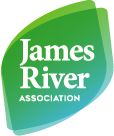Everyday Actions
To become a River Hero Home, you must select the required number of actions from the list below in addition to installing a River Friendly Practice on your property.
Pet Waste
Pet waste carries bacteria, such as E. Coli, that is washed into our waterways during rain or snow storms. So it’s simple… when you let your dog out to do his or her business, follow these 3 steps:
- Take a bag with you.
- Use the bag to pick up the waste.
- Toss it in the trash!
Smart Yard/Lawn/Garden Maintenance
With these actions you can save money, have a healthier lawn and garden, and do your part in keeping sediment and excess nutrients from entering the James River. (Select a minimum of 5)
- Don’t fertilize; if you do fertilize, test your soil first and fertilize at the correct time of year
- If you use a lawn maintenance company, make sure they are environmentally friendly
- Mow high and leave clippings in place
- Compost garden and kitchen waste and/or use compost on your lawn and garden
- Reduce/eliminate the use of herbicides/pesticides. Alternatively, use organic/natural methods
- Water your lawn and/or garden slow and deep
- Time your watering and water only in the morning or late afternoon
- Install a smart irrigation system
- Aerate your yard
- Redirect downspout to a pervious surface
Protect Storm Drains
When it rains, stormwater picks up pollutants and sediment from our lawns and streets before entering the storm drains and ditches, which, in a lot of cases, discharge directly into our waterways. That can create a variety of problems for the James River. These simple actions can reduce the amount of water that is leaving your property and keep litter and debris out of runoff. Labeling storm drains is a great way to educate your neighbors about the fact that they lead directly to bodies of water. (Select a minimum of 2)
- Only rain down the drain! Keep drains/drainage ditches clear of oil, litter, leaves etc.
- Label storm drains in your neighborhood
- Wash cars on pervious surfaces or at a car wash that recycles the water
- Plant a vegetated buffer between your yard and the street
Practice Smart Boat Ownership
If you own a boat, you come directly in contact with the James River or its tributaries. These simple actions can help keep pollutants, litter, and harmful products out of our waterways.(Required if you are a boat owner)
- Use only marine approved cleaning products
- Pump out holding tanks at approved facilities
- Be careful when filling gas and oil tanks – no spills in the water or on dock
- Use trash cans at landings or take trash home with you to dispose of it properly
- Properly dispose of fishing line
Proper Septic System Care
Proper care of your septic system is crucial to avoid excess nutrients and bacteria from entering the ground water and/or surface water. Malfunctioning septic systems can cause major threats to the health of our streams and rivers, as well as the health of you and your neighbors. (Required if you have a septic system)
- Do not use excessive amount of water in short periods of time and install water saving fixtures when possible
- Do not plant water loving plants, vegetables, or place mulch on top of drainfield. A grass lawn is the best thing to have on top of your drainfield
- Be mindful of what goes down your drain and into your garbage disposal
Many of these you may already do or are easy to start! For more information about any of the specific actions listed below, please visit the glossary page.

If you believe in conservation, then setting up a rain collection system is a great way to do your part to conserve water. Using this water to help your native plants thrive also provides habitat for wildlife and improves water quality in the James River.

